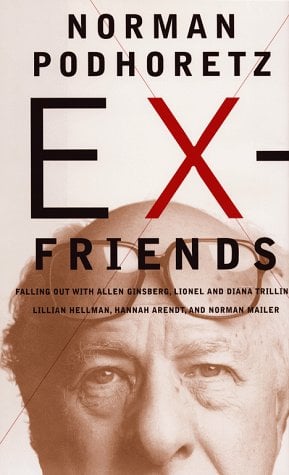Dear Norman,
This is the second (and probably the last) time I have written to you. The first time was way back in tumultuous 1968 when, as a kind of review of your book Making It, for the Hollins Critic, I wrote you an open letter entitled “My Silk Purse and Yours; Making It, Starring Norman Podhoretz.” When I collected that same review as the title piece of a gathering of literary criticism in 1992, I didn’t really change anything, but had to admit in a headnote that
Podhoretz has gone a long way, in his own way, since Making It (1968). My piece no longer applies . . . Making It was not a “bad” book. I seem to have thought it was unintentionally funny in many ways that our late twentieth century world is unintentionally funny and unbearably sad.
One of the recurring motifs of this new book, your fifth since then, is how many people bombed Making It, mostly, it seems, because they simply refused to allow the validity and integrity of your argument in that book that the intellectuals and the literati, including, of course, yourself, are most powerfully driven by personal ambition whether they admit it or not. You admitted it and took some heat for telling the plain truth. The people that you call “The Family” in Ex-Friends seem, by and large, to have been more than a little unhappy to have been exposed to your pitiless light.
I doubt that you remember me or my piece, guessing that you never saw it. Hoping that maybe you missed it. Because, though it did not question your main point, in fact firmly agreed with it and with you, the review was nevertheless a wiseass, smartmouth piece of work, based on the youthful fallacy that our celebrity culture was not likely to prevail, that a bunch of cosmopolitan New Yorkers were not really and truly shaping and manipulating the conscience and consciousness of our vast and wildly diverse nation.
I don’t apologize for my folly, but I do deeply regret having been so dreadfully wrong.
Much has changed since then. You have left the left behind, an act of courage in your crowd; and you have served influentially as the embattled and often impassioned editor of Commentary for more than 30 years. Sometimes I had no other choice than to agree with you about this and that. I would not agree, then or now, that these people, these distinguished ex-friends (and others you mention here and there like, for instance. Jack Kerouac and Jackie Kennedy) really had a whole helluva lot to do with the way we (Americans) live or die, think and feel, today or ever. There is no denying, Norman, that the celebrity culture has overwhelmed us and our common sense; no denying, then, that your new book, by its very existence, is plugged into the power and light of celebrity and that the fun of it all is to get your “take” on Ginsberg, the Trillings, Hannah Arendt, Hellman, and Mailer. For this to work as well as it does, you, too, must emerge as a kind of celebrity, a mover and shaker all on your own.
For the sake of any potential readers, let me say that this is a lively book, full of good gossip, some of it fresh and new, and many memorable anecdotes. These people, your erstwhile friends, from time to time surprise us even as they confirm the public images they have chosen to cultivate. And for a little while, thanks to the persuasive context you have deftly created and to the presented character of your narrator (yourself), it is possible briefly to suspend disbelief and to imagine that these folks, this Family, really were (in the jacket copy of your publisher) “the finest minds of their generation,” possessing “a level of erudition almost extinct.” Possible also to take at face value the hyperbolic blurbs (a string of pearls) by Paul Johnson, Cynthia Ozick, William Bennett, William Kristol, Mario Vargas Llosa, Robert Bork, and Jeane J. Kirkpatrick, and possible even to accept the validity of your own final self-appraisal —”In all truth, 1 much prefer who I am to who I was.” An enviable condition!
What I am trying to say is that this new book offers plenty of pleasure while it lasts and as long as the reader is able to ignore the astonishing claim that all our good ideas, all too soon to become public policy, come to us directly from the living rooms and dinner parties of a little group of New Yorkers whose demonstrable flaws of character should at the very least limit their power and influence over others. But—considering the flawed characters of all our political leaders from top to bottom, maybe you are right, Norman. Maybe we do owe you and these others more than we can imagine, including some gratitude to you personally for, once again, letting the cat out of the bag, as they say.
Good luck with this book. I enjoyed it and cheerfully recommend it to others . . . with reservations.
Yours truly, George Garrett
P.S. By the way, Norman, I don’t know if you noticed it or not, but your publisher has a different subtitle for the book in the publicity release prepared by one Cynthia Hoof—Ex-Friends: The Civil Wars of the New York Intellectuals. I find myself wondering which subtitle is really yours. I kind of like The Civil Wars one because it sounds a little less like People magazine or Vanity Fair.
[Ex-Friends: Falling Out With Allen Ginsberg, Lionel & Diana Trilling, Lillian Hellman, Hannah Arendt, and Norman Mailer, by Norman Podhoretz (New York: The Free Press) 256pp., $25.00]

Leave a Reply